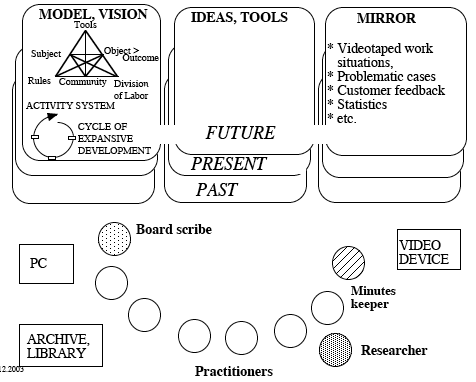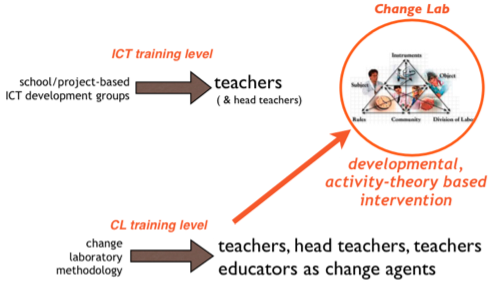Change laboratory: Difference between revisions
m (using an external editor) |
m (using an external editor) |
||
| Line 17: | Line 17: | ||
[[Category: Organization and management]] | [[Category: Organization and management]] | ||
[[Category: Educational theories]] | [[Category: Educational theories]] | ||
[[Category: Teacher development]] | |||
Revision as of 18:49, 10 July 2007
- By Alain Senteni, University of Mauritius, adapted by Daniel K. Schneider.
Based on Yrjö Engeström's theory of expansive learning (1987), the generic Change Laboratory method was developed in 1997, as a condensed way to carry out Developemental Work Research, an activity theory based methodology for studying and developing work practices in collaboratioin between the researcher and the practitioner. Used in Finland in tens of public and private organizations representing many branches of industry, the CL has been applied succesfully in health care services in Finland (Engeström, 1996, 1999a)(Engeström, Virkkunen et al., 1996) or large telecommunication companies (Virkkunen & Ahonen, 2004), and also for the integration of ICT in schools (Engeström, Engeström & Suntio, 2002).
The purpose of the method is to help a work team or the members of an organizational unit to encounter the problems they face in their daily work and systematically analyze the systemic causes of these problems and design and implement a new form for the activity to overcome the root cause of daily problems (Virkkunen, 2005).
The Change-Laboratory is a space (fig. 4) that offers to practitioners a wide variety of instruments for analyzing disturbances and bottlenecks in the prevailing work practices. It allows for constructing new models and tools, and for putting them on trial; it is also a forum for the cooperation between expert interventionists and local practitioners. The typical form of Change laboratory relies on the physical attendance of the community in a dedicated physical space. Though, it is possible to create simultaneously virtual, ICT-based tools that facilitate various aspects of change laboratories, as in the Knowledge-Practices Laboratory1 (Hakkarainen, 2004) or in the Distributed Change Lab project (Senteni, 2005). The Distributed Change Laboratory (DCL) tools allow participants (teachers, school administrators, local and international investigators) to share their experiences between physical meetings. Intelligent computer-mediated support may especially be needed when pursuing change-laboratory interventions in remote communities without direct support from more experienced interventionists.
During the lab sessions, practitioners take momentarily distance from their individual tasks and routine. Their joint activity becomes the object of their collaborative inquiry and developmental experimentation. Participants usually meet during work hours, once every one/two weeks, or even every afternoon, in the context of an intensive workshop. Based on the ethnographic analysis of the current practices (mirror) and the contradictions they have to face, the CL focuses on producing a new model of activity that defines a Zone of Proximal Development for the group. This ZPD is the distance between present actions of the individuals and the new form of group activity collectively generated as a solution to contradictory constraints (double-bind) potentially embedded in their everyday actions. That ZPD becomes the conceptual space where the group can expand the object of its activity, to produce eventually a new object. When put on trial, the new model is evaluated by the group by means of reflective tools (mirroring diagrams, video, diaries, etc), so that it can be questioned, bent and improved.
Developmental interventions using the Change Lab methodology were experimented successfully since 2005 in teachers training workshops (fig.5), in Mauritius (Senteni, 2006) and in Botswana (Senteni et al., 2005ab; 2006). A project, linking professional development of teachers for ICT integration and research started in November 2005 with a one week residential workshop in Botswana, involving a group of sixty teachers, head-teachers, teachers-trainers and policy-makers. The first workshop was organised by the Education Commission of the World Information Technology Forum (WITFOR 2005). The project was continued in 2006 in Botswana and Mauritius with the support of the Academy of Finland (2007-2008); it is now deemed to be expanded to Ethiopia, Madagascar and Seychelles (2007-2009), depending on additional funding requested in January 2007 from the European Union Edulink programme for ACP countries.

